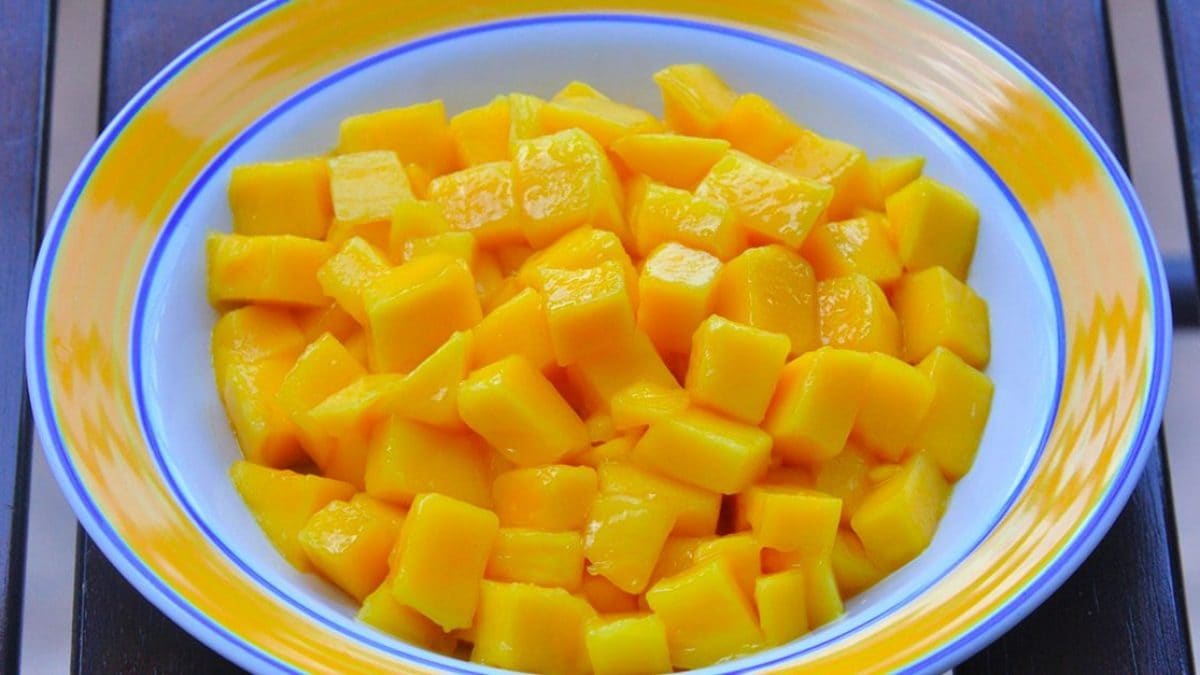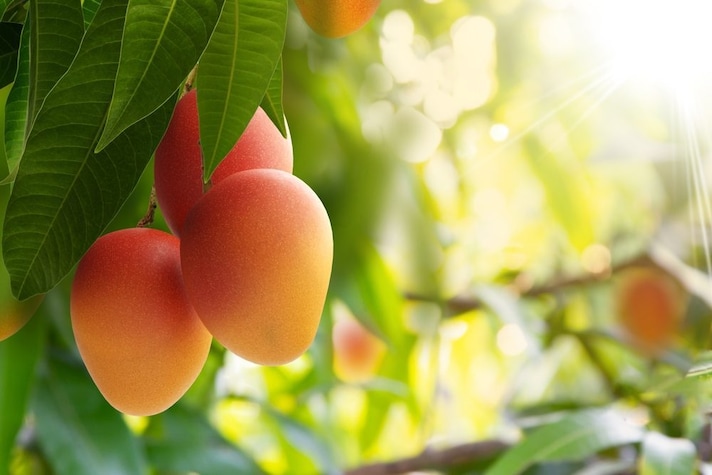
With its juicy, sugary and fragrant pulp, the mango is one of the most popular exotic fruits in the world, including the U.S.: originally from Southeast Asia, particularly India, where it is a national fruit considered sacred, a symbol of perfection and wisdom, it is grown in many tropical and subtropical areas including Latin America, Africa and even in some states of our country, such as Florida, California, Texas and Hawaii, finding a welcoming habitat favorable to development.
Botanically, mangoes belong to the Anacardiaceae family (the same as pistachios). Their scientific name is Mangifera indica, and there are hundreds of cultivars. What does mango look like? The fruits are characterized by a round or oblong shape and a smooth, thin skin: depending on the variety, their color can range from green to red, through orange and yellow. When they open, a large, flat, hard stone appears in the center, containing a seed. Surrounding it is the pulp, which is the only edible part. It has a bright orange color, is aromatic, with a sweet, enveloping flavor that can have slight acidic notes.
Mango is perfect for eating fresh, peeled into the scenic "porcupine" cut , or used as an ingredient in cooking, in desserts—from cheesecake to ice cream —and in savory recipes, such as the typical chutney, a sweet and sour spicy sauce. Besides being tasty, this fruit has many properties, beneficial for our well-being. Let's see what they are.
Properties and Benefits of Mango
Mango has a very interesting nutritional profile: it is an energizing fruit, but at the same time low in calories, as a 150g portion (which is equivalent to half) contains 84 kcal. It is made up of more than 80% water and is characterized by a high presence of simple sugars, especially fructose , in the amount of 18.9g per 150g according to the CREA nutritional tables, combined with a good quantity of total fiber (2.4g), which supports digestion and gives a sense of satiety. Like most tropical fruits, it is rich in vitamins, especially C (42mg), beta-carotene, a precursor of vitamin A, folates (essential during pregnancy for DNA synthesis), and mineral salts, in particular potassium, of which it can boast 375mg per portion, almost as much as a banana. Not to mention the presence of polyphenols, powerful antioxidants, including lupeol, which stands out for its positive effects on colon and pancreatic health. From this promising overview, here are the main benefits that could be obtained thanks to mango consumption.
It Helps Keep Blood Pressure Under Control
As reported by the New York Times, high blood pressure increases the risk of heart attacks and strokes, especially if you have a diet that exceeds salt consumption, one of the main causes of water retention. Potassium counteracts the action of sodium, stimulating diuresis and thus balancing fluid levels in the body, lowering blood pressure.

It Can Fight Chronic Constipation
A study showed that mango consumption can improve the symptoms of constipation in those suffering from constipation, both in terms of frequency and consistency of stool. Additionally, higher levels of short-chain fatty acids were found, which means an overall improvement in the state of the intestinal microbiota, reducing inflammation.
Important Source of Vitamin C
Among the benefits of mango is that of being an important source of vitamin C. According to the American Heart Association, a whole fruit provides 70% of the daily requirement of this micronutrient, which is important for the proper functioning of the immune system, for action against cellular aging, but also for facilitating the absorption of iron, a key component of hemoglobin: a deficiency can lead to weakness, tiredness and anemia.
It May Improve Blood Sugar Management
According to preliminary findings from recent research published in the journal Nutrients, mangoes could be a valuable food for reducing insulin resistance in overweight or obese adults, helping to decrease the risk of chronic diseases such as type 2 diabetes. The antioxidants, fiber, and polyphenols abundant in mangoes may help offset sugar consumption and aid blood glucose control.

Contraindications
The recommended daily serving of fresh mango is between 100 and 150 grams and should be part of a varied and balanced diet. As Maya Vadiveloo, professor in the Department of Nutrition and Food Science at the University of Rhode Island, suggests, it's important to choose different types of fruit, as each provides different benefits. There are no particular contraindications to eating mango: even those with diabetes or blood sugar problems can introduce it into their diet, in which case they should always consult their doctor. Mango allergy is rare, but not impossible: it's not related to eating it, but to touching it, in people sensitive to urushiol, an oily substance also found in cashews or plants like poison ivy and which causes skin reactions of varying severity depending on the person. Finally, if you're undergoing treatment, it's best to make sure the active ingredients in mango don't interfere with any prescribed medications.
;Resize,width=767;)
